Ask a question from expert
Healthcare Management: Assignment
47 Pages13287 Words254 Views
Added on 2020-11-23
Healthcare Management: Assignment
Added on 2020-11-23
BookmarkShareRelated Documents
Healthcare Management Interventions of Obesity with Learning
Disabilities
Disabilities
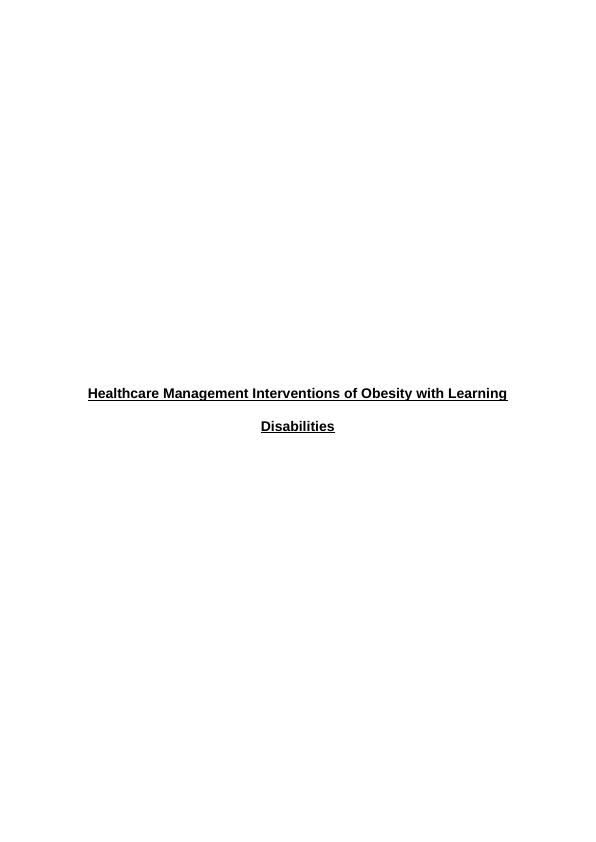
Table of Contents
Chapter One: INTRODUCTION...............................................................................................3
1.1 INTRODUCTION............................................................................................................. 3
1.2 BACKGROUND OF STUDY .............................................................................................. 3
1.3 STUDY AIM AND OBJECTIVES........................................................................................... 6
1.4 RATIONALE OF THE STUDY.............................................................................................. 6
1.5 STUDY SCOPE AND LIMITATIONS......................................................................................6
1.6 EXPECTED OUTCOMES .................................................................................................. 7
1.7 OVERVIEW OF CHAPTERS................................................................................................ 7
Chapter Two: LITERATURE REVIEW..................................................................................10
1. APPROACHES OF HEALTHCARE FOR MANAGEMENT OF OBESITY AMONG INDIVIDUALS....................10
2. FACTORS INFLUENCING THE EFFECTIVE HEALTHCARE MANAGEMENT OF OBESITY AMONG INDIVIDUALS
SUFFERING FROM LEARNING DISABILITIES................................................................................10
3. ASPECTS RELATED TO THE ACHIEVEMENT OF OPTIMUM PRACTICES FOR THE HEALTHCARE
MANAGEMENT OF OBESITY IN INDIVIDUALS SUFFERING FROM LEARNING DISABILITIES........................11
Chapter Three : RESEARCH METHODOLOGY...................................................................12
2.1 RESEARCH METHODOLOGY............................................................................................ 12
2.2 STUDY DESIGN........................................................................................................... 12
2.3 DATA COLLECTION...................................................................................................... 12
2.4 INCLUSION CRITERIA.................................................................................................... 14
2.5 EXCLUSION CRITERIA................................................................................................... 15
2.6 SAMPLE..................................................................................................................... 15
2.7 RESEARCH PHILOSOPHY................................................................................................ 17
Chapter Four: Findings and Discussions. ................................................................................19
3.1 INTRODUCTION........................................................................................................... 19
3.2 FINDINGS AND DISCUSSIONS.........................................................................................19
Health care Interventions.......................................................................................19
Issues faced by children suffering from obesity ...................................................21
Government Policies for Obese individuals with learning disabilities ................22
Consideration of Social Cognitive theory ............................................................24
Impact of Nutrition and exercise over health of Children ...................................26
Implementation of Interventions in School...........................................................30
Chapter Five: Conclusion and Recommendations ..................................................................38
4.1 CONCLUSION AND RECOMMENDATIONS............................................................................38
4.2 LIMITATION OF RESEARCH:-...........................................................................................39
4.3 REFLECTION............................................................................................................... 39
4.4 IMPLICATIONS............................................................................................................. 40
4.5 RECOMMENDATIONS.................................................................................................... 41
4.6 RECOMMENDATIONS FOR FUTURE RESEARCH.....................................................................41
References................................................................................................................................42
Chapter One: INTRODUCTION...............................................................................................3
1.1 INTRODUCTION............................................................................................................. 3
1.2 BACKGROUND OF STUDY .............................................................................................. 3
1.3 STUDY AIM AND OBJECTIVES........................................................................................... 6
1.4 RATIONALE OF THE STUDY.............................................................................................. 6
1.5 STUDY SCOPE AND LIMITATIONS......................................................................................6
1.6 EXPECTED OUTCOMES .................................................................................................. 7
1.7 OVERVIEW OF CHAPTERS................................................................................................ 7
Chapter Two: LITERATURE REVIEW..................................................................................10
1. APPROACHES OF HEALTHCARE FOR MANAGEMENT OF OBESITY AMONG INDIVIDUALS....................10
2. FACTORS INFLUENCING THE EFFECTIVE HEALTHCARE MANAGEMENT OF OBESITY AMONG INDIVIDUALS
SUFFERING FROM LEARNING DISABILITIES................................................................................10
3. ASPECTS RELATED TO THE ACHIEVEMENT OF OPTIMUM PRACTICES FOR THE HEALTHCARE
MANAGEMENT OF OBESITY IN INDIVIDUALS SUFFERING FROM LEARNING DISABILITIES........................11
Chapter Three : RESEARCH METHODOLOGY...................................................................12
2.1 RESEARCH METHODOLOGY............................................................................................ 12
2.2 STUDY DESIGN........................................................................................................... 12
2.3 DATA COLLECTION...................................................................................................... 12
2.4 INCLUSION CRITERIA.................................................................................................... 14
2.5 EXCLUSION CRITERIA................................................................................................... 15
2.6 SAMPLE..................................................................................................................... 15
2.7 RESEARCH PHILOSOPHY................................................................................................ 17
Chapter Four: Findings and Discussions. ................................................................................19
3.1 INTRODUCTION........................................................................................................... 19
3.2 FINDINGS AND DISCUSSIONS.........................................................................................19
Health care Interventions.......................................................................................19
Issues faced by children suffering from obesity ...................................................21
Government Policies for Obese individuals with learning disabilities ................22
Consideration of Social Cognitive theory ............................................................24
Impact of Nutrition and exercise over health of Children ...................................26
Implementation of Interventions in School...........................................................30
Chapter Five: Conclusion and Recommendations ..................................................................38
4.1 CONCLUSION AND RECOMMENDATIONS............................................................................38
4.2 LIMITATION OF RESEARCH:-...........................................................................................39
4.3 REFLECTION............................................................................................................... 39
4.4 IMPLICATIONS............................................................................................................. 40
4.5 RECOMMENDATIONS.................................................................................................... 41
4.6 RECOMMENDATIONS FOR FUTURE RESEARCH.....................................................................41
References................................................................................................................................42
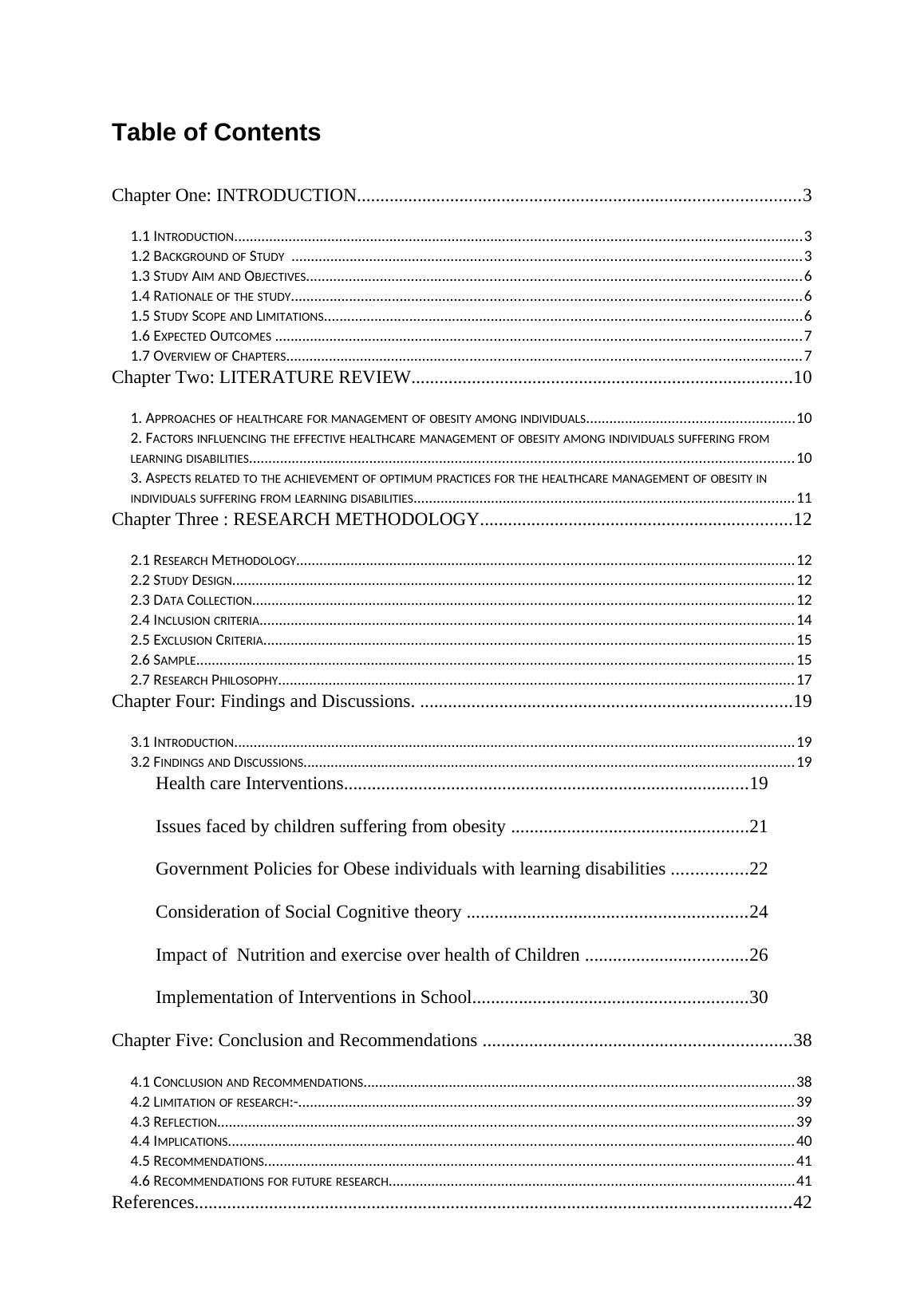

`
Chapter One: INTRODUCTION
1.1 Introduction
This study is associated with the assessment of the various healthcare management
interventions for obesity among people with learning disabilities. This will include an
assessment of the various subjectivities associated with the notion of the healthcare
interventions among individuals with learning disabilities with respect to the
prevention of obesity. This will include the review of various past literature and
studies associated with the topic, in addition to the development of research analysis
under the relevant context. This first chapter will include the aim and objectives of
the study, as well as the relevant background and the overall context of the
development of this research study.
1.2 Background of Study
Studies conducted by Bergström et al. 2013 were aimed towards assessment of
interventions to be maintained and the development of optimum diet controls and
plans for individuals suffering from intellectual disabilities. Through the
implementation of a randomised control trial (RCT) approach, the authors
highlighted various aspects related to the establishment of optimum diet plans and
interventions to be considered for maintenance of optimum health and weight of
individuals with learning disabilities. Moreover, the authors also highlighted related
challenges and discrepancies in relation to weight management among individuals
suffering from intellectual disabilities. An extensive review of the study will enable
identification of numerous underlying subjectivities involved, allowing documentation
of optimum techniques related to management interventions of obesity among
individuals with learning disabilities.
Chapter One: INTRODUCTION
1.1 Introduction
This study is associated with the assessment of the various healthcare management
interventions for obesity among people with learning disabilities. This will include an
assessment of the various subjectivities associated with the notion of the healthcare
interventions among individuals with learning disabilities with respect to the
prevention of obesity. This will include the review of various past literature and
studies associated with the topic, in addition to the development of research analysis
under the relevant context. This first chapter will include the aim and objectives of
the study, as well as the relevant background and the overall context of the
development of this research study.
1.2 Background of Study
Studies conducted by Bergström et al. 2013 were aimed towards assessment of
interventions to be maintained and the development of optimum diet controls and
plans for individuals suffering from intellectual disabilities. Through the
implementation of a randomised control trial (RCT) approach, the authors
highlighted various aspects related to the establishment of optimum diet plans and
interventions to be considered for maintenance of optimum health and weight of
individuals with learning disabilities. Moreover, the authors also highlighted related
challenges and discrepancies in relation to weight management among individuals
suffering from intellectual disabilities. An extensive review of the study will enable
identification of numerous underlying subjectivities involved, allowing documentation
of optimum techniques related to management interventions of obesity among
individuals with learning disabilities.
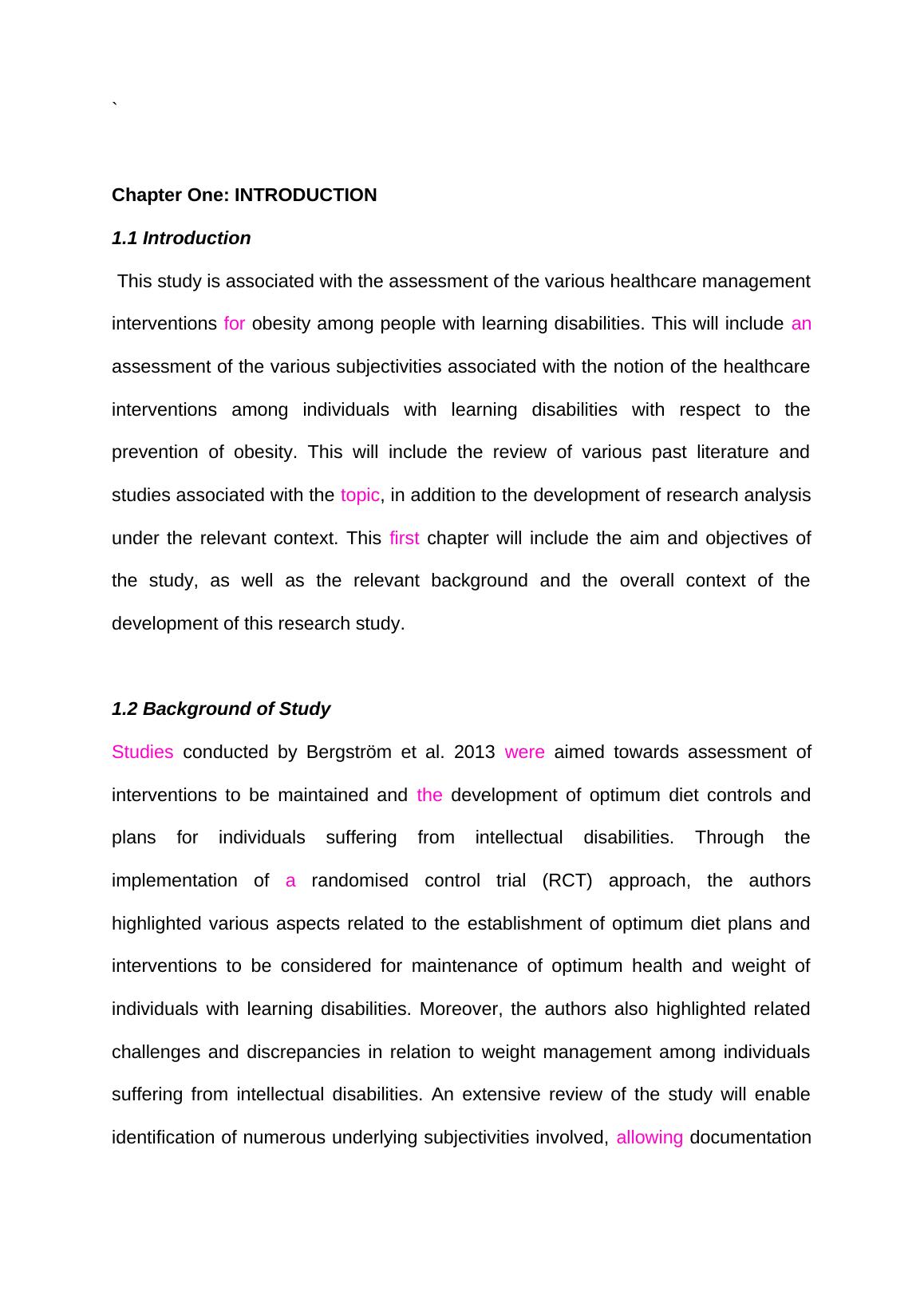
In studies conducted by Spanos, Melville and Hankey (2013a), the authors
developed their research findings through critical and interpretative analysis of
relevant literature and research studies related to intervention measures for the
management of weight among individuals suffering from learning disabilities. The
inferential analysis presented by Spanos and colleagues (2013a) was conducted
through assessment of related literature ranging from the year 1982 to 2011. This
augments the overall effectiveness of the systematic review approach. The results of
findings acquired by the study assert the notion of numerous intervention measures
including avoid junk food, intake balanced diet, prefer daily exercise and regular
check ups. These interventions are based upon associated components, attrition
rates and respective methodology of interventions being undertaken. Moreover, the
development of the systematic review also allows for numerous approaches to be
appraised and the taking under consideration of the most appropriate approach of
intervention to be considered for management of weight of individuals with
intellectual disabilities.
Studies done by Robertson, et al. (2014) differ in that the study acquired data from
participants who self-reported the prevalence of intellectual disabilities. The study is
based upon the notion that individuals with intellectual disabilities tend to have higher
mortality and morbidity rates compared to others, including the prevalence of
obesity. The study conducted by Robertson et al. (2014) uses a cross-sectional
survey of 520 participants for the development of effective research findings. The
developed their research findings through critical and interpretative analysis of
relevant literature and research studies related to intervention measures for the
management of weight among individuals suffering from learning disabilities. The
inferential analysis presented by Spanos and colleagues (2013a) was conducted
through assessment of related literature ranging from the year 1982 to 2011. This
augments the overall effectiveness of the systematic review approach. The results of
findings acquired by the study assert the notion of numerous intervention measures
including avoid junk food, intake balanced diet, prefer daily exercise and regular
check ups. These interventions are based upon associated components, attrition
rates and respective methodology of interventions being undertaken. Moreover, the
development of the systematic review also allows for numerous approaches to be
appraised and the taking under consideration of the most appropriate approach of
intervention to be considered for management of weight of individuals with
intellectual disabilities.
Studies done by Robertson, et al. (2014) differ in that the study acquired data from
participants who self-reported the prevalence of intellectual disabilities. The study is
based upon the notion that individuals with intellectual disabilities tend to have higher
mortality and morbidity rates compared to others, including the prevalence of
obesity. The study conducted by Robertson et al. (2014) uses a cross-sectional
survey of 520 participants for the development of effective research findings. The
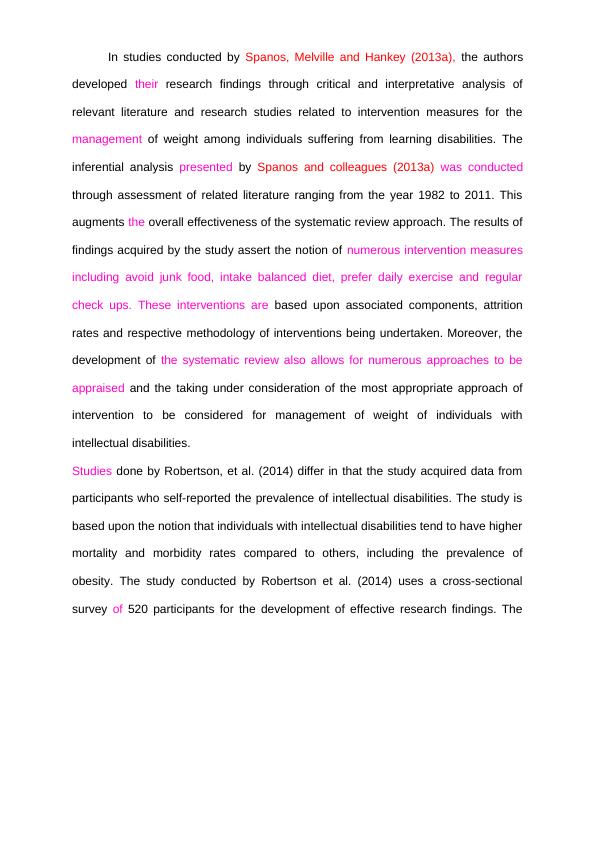
results of the study reflect that there are numerous aspects related to the prevalence
of overweight and obesity among individuals with learning disabilities. Furthermore,
Robertson et al. (2014) also identified the use of tobacco and the relative absence of
appropriate diet plans to be related to increased obesity among the individuals. The
study concludes with the notion that individuals with learning disabilities are
considered "vulnerable" and the establishment of augmented healthcare should
provide interventions to prevent these individuals from becoming overweight.
1.2.1 Paragraph 1
Apart from the assessment of patient perspectives regarding the notion of
intervention measures and management of obesity in individuals with learning
disabilities, it is necessary to undertake an evaluation of the perceptions of the
carers as well. Studies by Spanos, et al. (2013a) have addressed this particular
aspect. Through the establishment of qualitative studies, the authors highlighted the
perceptions of carers on interventions being used for the delivery of care for
individuals with intellectual disabilities for the maintenance of appropriate weight.
1.2.2 Paragraph 2
The findings of the study by, Spanos et al. (2013a) are based upon three major
themes that were assessed through semi-structured interviews: the perception of
carers towards interventions measures for patients, the perception of carers towards
the health of participants and barriers and facilities to implement appropriate care
measures for the patients. The conclusion of the study recommends the
establishment of tailored measures to be used for implementation of effective and
enhanced intervention for patients with intellectual disabilities.
1.3 Study Aim and Objectives
of overweight and obesity among individuals with learning disabilities. Furthermore,
Robertson et al. (2014) also identified the use of tobacco and the relative absence of
appropriate diet plans to be related to increased obesity among the individuals. The
study concludes with the notion that individuals with learning disabilities are
considered "vulnerable" and the establishment of augmented healthcare should
provide interventions to prevent these individuals from becoming overweight.
1.2.1 Paragraph 1
Apart from the assessment of patient perspectives regarding the notion of
intervention measures and management of obesity in individuals with learning
disabilities, it is necessary to undertake an evaluation of the perceptions of the
carers as well. Studies by Spanos, et al. (2013a) have addressed this particular
aspect. Through the establishment of qualitative studies, the authors highlighted the
perceptions of carers on interventions being used for the delivery of care for
individuals with intellectual disabilities for the maintenance of appropriate weight.
1.2.2 Paragraph 2
The findings of the study by, Spanos et al. (2013a) are based upon three major
themes that were assessed through semi-structured interviews: the perception of
carers towards interventions measures for patients, the perception of carers towards
the health of participants and barriers and facilities to implement appropriate care
measures for the patients. The conclusion of the study recommends the
establishment of tailored measures to be used for implementation of effective and
enhanced intervention for patients with intellectual disabilities.
1.3 Study Aim and Objectives
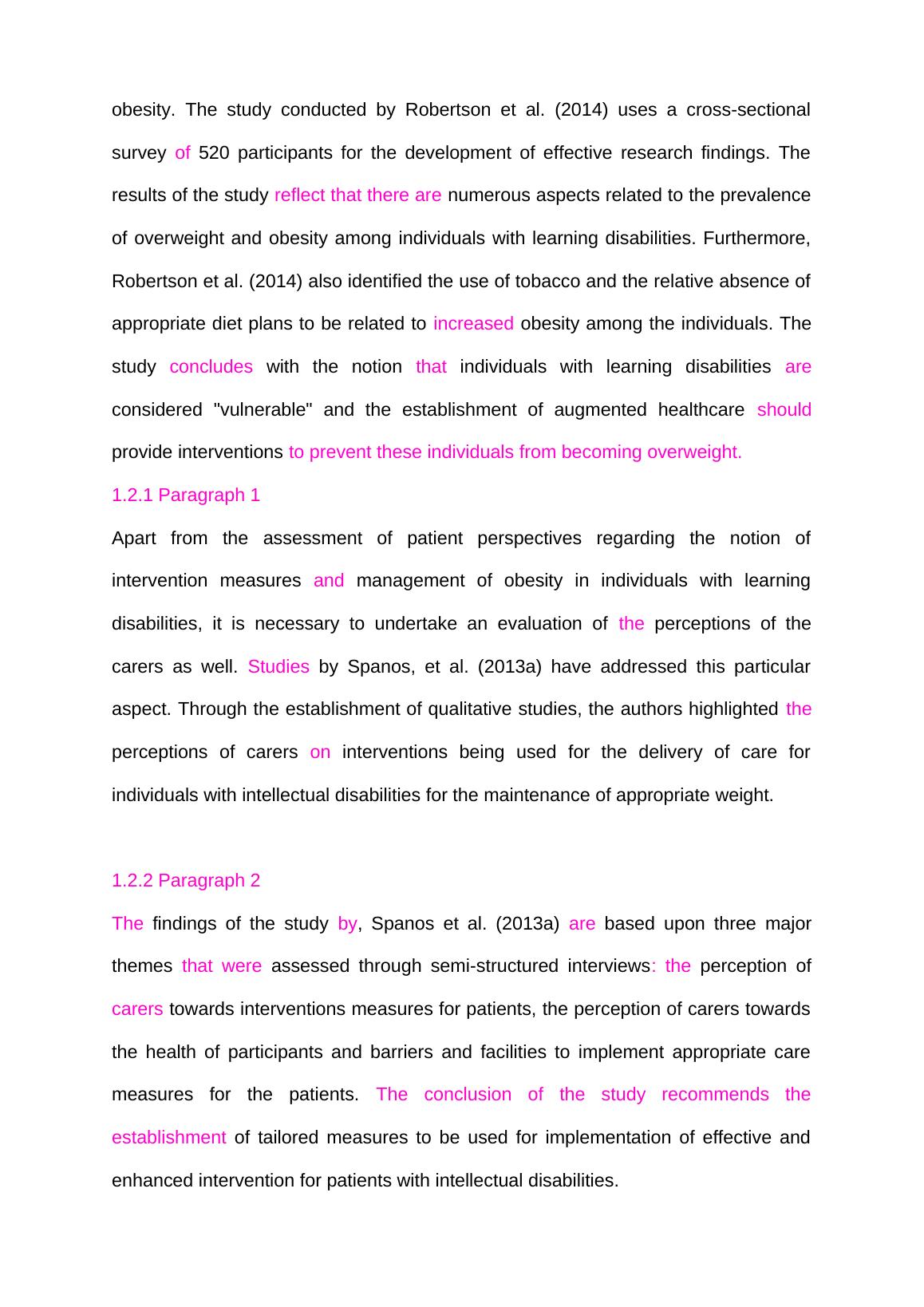
This study will aim to "assess the various healthcare management interventions of
obesity among people with learning disabilities." In order to achieve the overall aim
of this study, the following objectives have been defined:
To evaluate the various healthcare approaches related to management of
obesity among individuals
To appraise the factors influencing the effective management of obesity
among individuals suffering from learning disabilities To assess the aspects related to the achievement of optimum practices for
the healthcare management of obesity in individuals suffering from learning
disabilities
Research Question
The research question
What are the new healthcare management interventions for obesity in
individuals with learning disabilities?
1.4 Rationale of the study
The rationale of the study is that it will help to evaluate the current health care
management intervention of obesity in individuals with learning disabilities. There are
many new interventions that have been used by the people in current health care
management to overcome the issues faced by people who suffer from obesity and
have learning disabilities.
obesity among people with learning disabilities." In order to achieve the overall aim
of this study, the following objectives have been defined:
To evaluate the various healthcare approaches related to management of
obesity among individuals
To appraise the factors influencing the effective management of obesity
among individuals suffering from learning disabilities To assess the aspects related to the achievement of optimum practices for
the healthcare management of obesity in individuals suffering from learning
disabilities
Research Question
The research question
What are the new healthcare management interventions for obesity in
individuals with learning disabilities?
1.4 Rationale of the study
The rationale of the study is that it will help to evaluate the current health care
management intervention of obesity in individuals with learning disabilities. There are
many new interventions that have been used by the people in current health care
management to overcome the issues faced by people who suffer from obesity and
have learning disabilities.
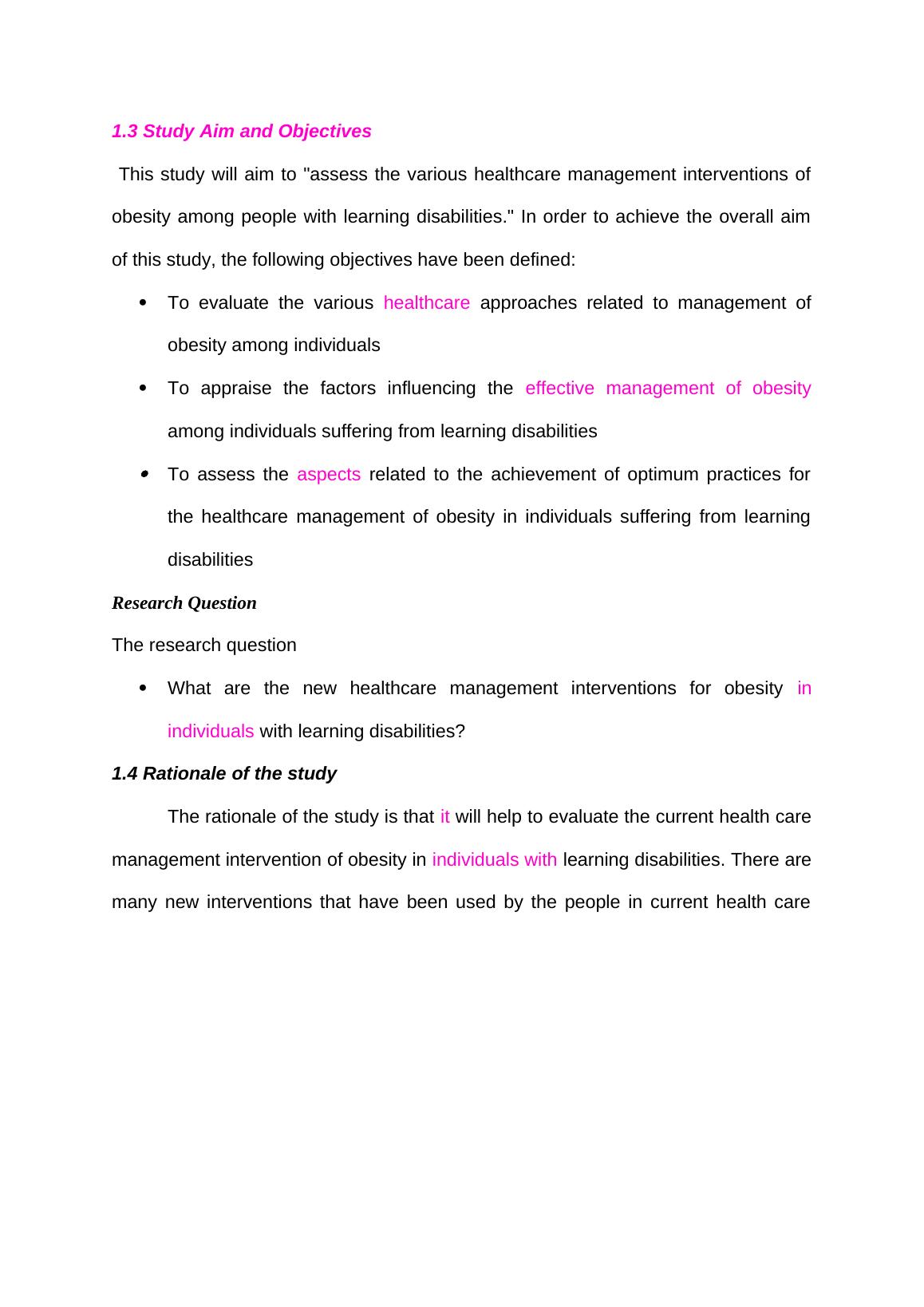
1.5 Study Scope and Limitations
As a result of this particular research study, readers will be able to identify several
themes related to healthcare management of obesity among individuals suffering
from learning disabilities. In this regard, various related factors of influence will also
be discussed. This will enable enhanced comprehension regarding the topic while
utilising this and similar studies for the establishment of evidence-based practices- a
necessary norm in healthcare practices. Moreover, this study will also enable
identification of the most effective practices and approaches to be utilised in the
management of obesity among individuals with learning disabilities.
1.6 Expected Outcomes
The proposed research is based on performing an investigation into various
healthcare management interventions regarding obesity along with learning
disabilities. By conducting this research, the investigator will be able to identify that
the main causes that lead to an increase in obesity among people with learning
disabilities. It will further help in determining several factors that influence the
effective management of healthcare in terms of obesity so that future practices can
be improved. In addition to this, it will also identify several measures that can be
taken to reduce the number of cases of obesity cases so as to improve people's
standard of living.
1.7 Overview of Chapters
This dissertation consists of four chapters that are based upon the intrinsic
requirements of research.
CHAPTER 1: INTRODUCTION
The first chapter encompasses an introduction to the overall topic under research
consideration. This further includes rationale of project and reasons behind
As a result of this particular research study, readers will be able to identify several
themes related to healthcare management of obesity among individuals suffering
from learning disabilities. In this regard, various related factors of influence will also
be discussed. This will enable enhanced comprehension regarding the topic while
utilising this and similar studies for the establishment of evidence-based practices- a
necessary norm in healthcare practices. Moreover, this study will also enable
identification of the most effective practices and approaches to be utilised in the
management of obesity among individuals with learning disabilities.
1.6 Expected Outcomes
The proposed research is based on performing an investigation into various
healthcare management interventions regarding obesity along with learning
disabilities. By conducting this research, the investigator will be able to identify that
the main causes that lead to an increase in obesity among people with learning
disabilities. It will further help in determining several factors that influence the
effective management of healthcare in terms of obesity so that future practices can
be improved. In addition to this, it will also identify several measures that can be
taken to reduce the number of cases of obesity cases so as to improve people's
standard of living.
1.7 Overview of Chapters
This dissertation consists of four chapters that are based upon the intrinsic
requirements of research.
CHAPTER 1: INTRODUCTION
The first chapter encompasses an introduction to the overall topic under research
consideration. This further includes rationale of project and reasons behind
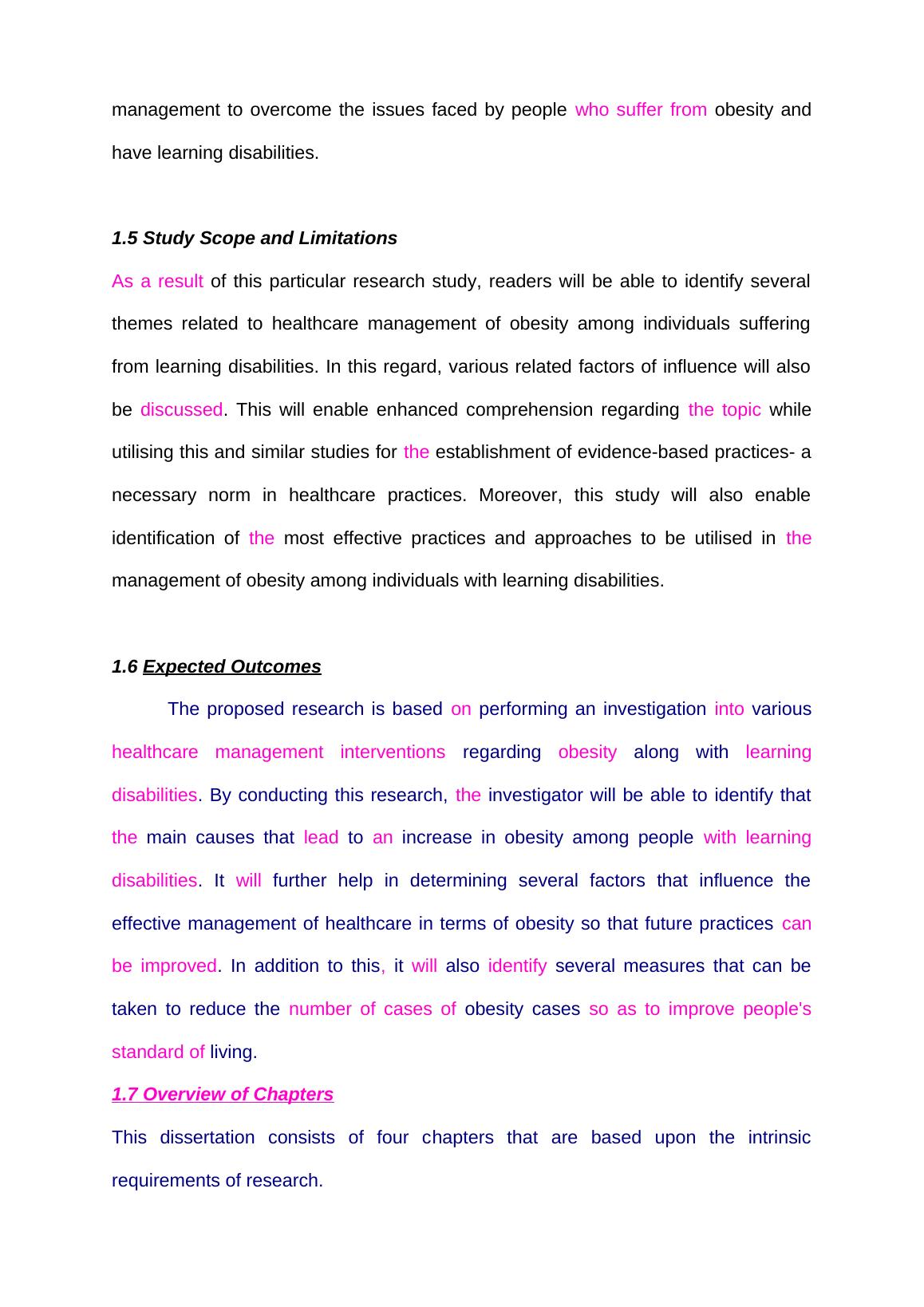
End of preview
Want to access all the pages? Upload your documents or become a member.
Related Documents
Impact of diet on obesity in Englandlg...
|58
|12988
|50
Assignment on Effectiveness of School-based Interventions to Preventlg...
|55
|12765
|17
Effectiveness of Inpatient and Community Treatment for Anorexia Nervosalg...
|72
|20170
|66
Learning Disability Nursing (Doc)lg...
|16
|4734
|105
Impact of Physical Activity in Preventing Obesity in Children - Systematic Reviewlg...
|29
|9981
|467
Perception of Physicians about Advanced Nurse Practitioners in Saudi Arabialg...
|59
|11894
|444